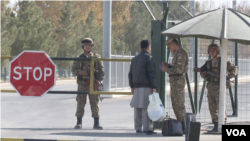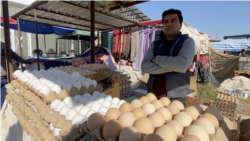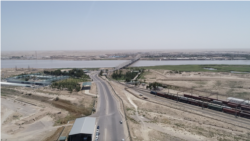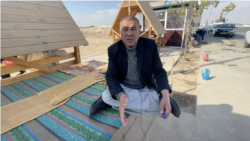On a cold but sunny day, Nadim, an Afghan migrant in his 30s, sells eggs and rice at the local farmers market in the Uzbek border city of Termez, administrative center of Surkhandarya region. He doesn't say how long he's been in Uzbekistan, but he does talk about his three young children, all of whom are being educated in Uzbekistan.
Like thousands of other Afghans who found themselves in Uzbekistan when Taliban forces marched into Kabul in mid-August, Nadim and his family are in the country legally but are unsure how long they will be able to stay or what will happen to them if they are forced to return to Afghanistan.
"I'm happy here and so is my family and thankful that the Uzbek government wants to help my people in Afghanistan," Nadim told VOA. "But I ask the Uzbek president to understand the challenges we face. We cannot return to Afghanistan. I want my children to grow up in Uzbekistan and hope this government grants us permanent residency."
The Uzbek government sealed its border with Afghanistan immediately after the Taliban takeover and declared no Afghan refugees would be allowed into the country. While its airport was made available as a refueling stop for refugee flights to Europe and beyond, the refugee ban remained in place, even after the Termez crossing was reopened to approved commercial traffic.
The policy weighs heavily on people like Dilobar, a woman in her 20s who sells dairy products in the bazaar. While she is an Uzbek citizen, her husband is an Afghan and trapped in Kabul.
"People like him are not allowed into Uzbekistan now," she said. "They don't issue visas for visits to come see us. We are requesting the Uzbek president to let Afghans, like my husband, unite with their families here," she said.
Border crossing at Termez, which straddles the only highway linking Uzbekistan and Afghanistan, is currently permitted only for business purposes and require a letter of support from one of the two governments. Most new visas are strictly limited to usually not more than two weeks.
That has meant hardship for an estimated 10,000 to 13,000 Afghans living in Uzbekistan, most of them since before the Taliban seizure of Kabul. Ethnic Uzbeks constitute a large share of the population in northern Afghanistan, and many families are divided between the two countries.
Surkhandarya Governor Tura Bobolov told VOA in an interview that despite the ban on refugee admissions, Afghans already living legally in Termez are welcome and an important part of the community.
"There are 374 businesses in our region either owned by Afghans or joint ventures with them. … Some new buildings here in Termez are constructed by them," he noted. "I meet with many of them regularly and have given guarantees that their work and businesses are safe here. We want them here."
The Uzbek government is anxious to help the residents of Afghanistan, he said, and he is hopeful that the new Taliban government will soon be able to restore stability and overcome the dire financial straits the country is facing.
"I find the leaders of the interim government in Kabul more principled that those before, so I'm hopeful the situation will improve in Afghanistan," Bobolov said. "As for us, we are doing everything we can to ensure security of our own people and assist our neighbor."
Indeed, life in Uzbekistan is good for some Afghan citizens like Fridulla Hasanzade, a native of Kabul who has invested nearly $1 million in a Termez restaurant and hopes to take advantage of a program facilitating permanent residency for major investors.
"I chose Termez for two reasons," Hasanzade told VOA. "My cousin had a good experience here, and it's so close to Afghanistan. It's easy to travel home — by car to Mazar-e-Sharif, and then a short flight to Kabul. But because of the current difficulties, I've not been able to visit."
Uzbekistan has welcomed other Afghans with needed skills like Gul Ahmad Tanish, an ethnic Uzbek gynecologist and obstetrician who is working in a rural district not far from Termez. He was on a professional tour in Uzbekistan when Kabul fell to the Taliban and was invited to stay because of his medical training.
But other Afghans — even those who have lived in Uzbekistan for years — are living with the possibility they could be expelled at any time.
Mahmud Amirzade came with his parents to Uzbekistan when he was 10 and has been living for 15 years in the country, where his family runs a business and has contracts with the government. "Yet we are worried that our visas will not be extended. Hopefully, the Uzbek government will let us stay," Amirzade said.
On the Uzbek side of the border crossing, about a dozen of worried-looking Afghan men wait in hope that soon they will be able to travel back and forth.
"If I leave Uzbekistan now, I won't be able to come back," explained one man, a native of the northern Afghan city of Mazar-e-Sharif. "So, for now, we just wait for good news in terms of travel. Entry is very restricted now."
One Afghan trader told VOA that despite current challenges, he has been able to maintain his business shipping beans and other agricultural products into Afghanistan.
"Goods are moving, which is what matters most now," said the man, who introduced himself as Amiri. "Life in Afghanistan would be much worse than now if Uzbekistan wasn't allowing food and other critical products. Cooking oil, wheat flour."
"You can't imagine how hard the situation is in Afghanistan now," he added. "The northern part of Afghanistan will not be able to survive without food sent from here. Their own wheat harvest was very poor this year, which means they are desperate for flour."
Afghans here and elsewhere in Uzbekistan speculate that the Taliban will not stay in power for long if the economic situation becomes more dire. But Amiri isn't so sure.
"Still, you can expect anything from hungry people," he said. "They want to eat. They want opportunity. They want a chance to live."
This story originated in VOA's Uzbek Service.







